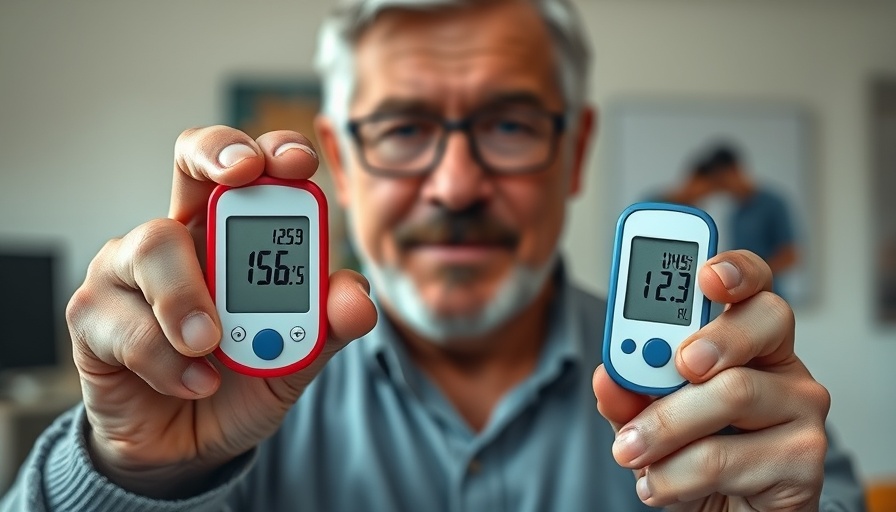
Unlocking the Secrets: Power Strategies to Lower Blood Sugar
In today's fast-paced world, managing blood sugar levels is crucial, especially for those over the age of 50. With a myriad of options available, finding the most effective methods to lower blood sugar can be overwhelming. Fortunately, recent insights provide us with tactics that stand out from the crowd.
In THIS Lowers Blood Sugar Levels FASTER than Anything Else, the discussion dives into effective strategies for blood sugar management, exploring key insights that sparked deeper analysis on our end.
High-Intensity Interval Training: A Game-Changer for Blood Sugar Control
One of the simplest yet most effective ways to lower blood sugar is through High-Intensity Interval Training (HIIT). Engaging in short bursts of intense exercise, followed by adequate rest, activates your muscles and helps deplete excess sugar from the bloodstream. Simple activities like burpees or short sessions on a spin bike can have profound impacts. Just a few minutes a day can be a quick and efficient way to keep your blood sugar in check.
The Surprising Benefits of Apple Cider Vinegar
Apple cider vinegar (ACV) is more than just a trendy health tonic; it’s a powerhouse for blood sugar management. Adding a tablespoon of ACV to water and consuming it before or after a high-carb meal can reduce blood sugar spikes by up to 34%. The acetic acid in ACV aids in glucose absorption by the muscles, making it a vital addition to your daily health regimen.
Natural Supplements: A Holistic Approach to Blood Sugar
Consider incorporating supplements like berberine and N-acetylcysteine (NAC) into your routine. Berberine, a natural alternative to metformin, shows potent effects on blood sugar levels without the associated side effects. Additionally, combining berberine with NAC helps reduce oxidative stress caused by excess sugar, enhancing overall metabolic health.
Post-Meal Walks: Simple but Effective
After indulging in a carbohydrate-heavy meal, a post-meal walk can work wonders. Spending 25 to 30 minutes walking helps your body utilize the glucose from the meal, preventing fat storage and promoting a healthier metabolism. It’s a simple practice that can easily be incorporated into your daily routine.
Potassium and Magnesium: Essential Minerals for Blood Sugar Management
Understanding the role of minerals like potassium and magnesium in blood sugar control is essential. Potassium helps move glucose into the cells for energy, while magnesium is crucial for insulin production. Together, these minerals support a healthier metabolic environment, especially important for those managing diabetes.
Ketone Supplements: Fueling the Brain and Body
Another innovative approach is the use of ketone supplements. By providing an alternative fuel source for the brain, ketones can decrease the demand for glucose. This can lead to improved cognitive function and less brain fog, ensuring your mind remains sharp even as you manage your blood sugar levels.
The Role of Sodium: How Salt Can Help
Interestingly, sodium plays a unique role in blood sugar management. Simply adding a bit of sea salt to your meals can help regulate stress-induced blood sugar spikes. Stress can lead to sleepless nights and higher glucose. A little salt can go a long way in balancing these effects, so consider it when planning your meals.
Dry Fasting: A Powerful Method for Blood Sugar Regulation
Finally, let's talk about a more bold tactic: dry fasting. Unlike water fasting, dry fasting involves abstaining from both food and water. This method can induce hormone changes that lower blood sugar levels significantly. It’s important to ease into this practice, ensuring you maintain a balanced and healthy diet outside of fasting periods.
Empowering Yourself Through Knowledge and Action
The key takeaways from these strategies are both practical and attainable. Engaging in brief, intense workouts, embracing the benefits of natural supplements, and making simple lifestyle changes can lead to profound effects on your blood sugar levels. The choices we make today can empower us to live healthier, happier lives.
Don't wait for the signs of high blood sugar to take action. Integrate these strategies into your lifestyle, creating a balanced approach to your well-being, and consult with healthcare professionals if you're unsure about starting any new regimen.
 Add Element
Add Element  Add Row
Add Row 




Write A Comment